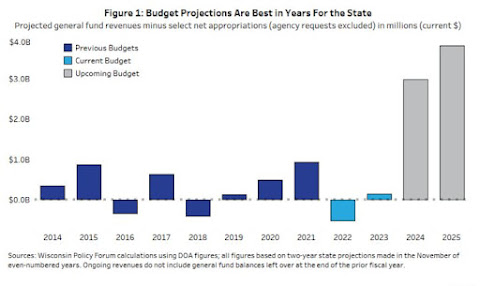The Wisconsin Policy Forum recently put out an update
reminding us of the once-in-a-generation amount of money that state lawmakers can play with in the upcoming state budget. And the Policy Forum used a different perspective on the numbers that show just how much better off our budget is from the
structural side.
To answer that question, we sought to present a bare-bones budget, one that showed a starting place for the budget process before most decisions are made and one that could be readily compared with previous years. To do so, the Wisconsin Policy Forum started with the projected increases in tax collections along with the base spending levels within the state’s main fund. After including certain routine adjustments but excluding all new spending requests by state agencies, we find general fund revenues are currently projected to exceed budgeted spending by a staggering $6.8 billion over the two-year cycle running from July 2023 to June 2025.
The excess revenues amount to just under $3 billion, or 15.3% of spending, in year one of the budget and more than $3.8 billion, or 19.6% of spending, in year two.
These numbers do not factor in the rising cost of present services so they should not be seen as representing the state’s actual surplus, which will be less after accounting for those costs.
But after 2 years of increased inflation and some diminishing of federal help from COVID aid programs, there is going to be a need to spend at least some of those extra funds. And the Policy Forum goes over some of the places that extra spending may go to.
However, the WPF numbers shown in Figure 1 do not factor in the projected expense of maintaining current services within Medicaid health programs – an estimated $754.7 million over the next two years – or include additional funds for K-12 schools or local governments, prisons, the University of Wisconsin System, or pay raises for state workers to reflect rapid inflation. New spending appears particularly likely for Medicaid and aid to schools and local governments, which are facing rising inflation, tight state property tax limits, and the end of federal pandemic aid.
I also like how the Policy Forum breaks down the different spending options, to illustrate just how much of the $6.8 billion would be used up in various policy choices.

I'll add that K-12 school funding and a few other aids can be done in a couple of ways - either an increase of resources (and an expansion of revenue limits), or ivia reducing the amount of property taxes used to fund those services. Or a combination thereof (which I think is the best way to do it - improve resources while also reducing our outdated reliance on property taxes).
I'll also repeat a couple of DOT-related ideas I have as a source for some of this money. The first is a permanent increase the amount of General Fund money that goes to the state's Transportation Fund (and lessening the reliance on gas taxes, which will go down over time with gas consumption continuing to fall).
The second would involve sending money to the many Wisconsin communities that have had to put in local wheel taxes in the last decade (to fix their roads and free up funds for other needs), if those communities get rid of their wheel taxes for the next 4 years. I'd also give incentive payments to communities that don't have wheel taxes, to reward those places that haven't had to dip into that somehwat regressive revenue source.
And income taxes can also be cut in some way, but not severely and I'd still have most of the benefit go to the lesser income-earners.
What's remarkable is that we can do all of these things, and still could maintain a structural surplus while keeping the billions of dollars this state already has in the bank. That's good insurance for any economic downturn that might happen due to the Fed's continued desire to crush inflation, and if we reach capacity in a time of a near-maxed out work force.
Pretty good spot to be in. And this state needs to take advantage of it.


Hope you saw this on WKOW's Capital City Sunday interview with Jason Stein. Best bottom-line questions.
ReplyDeletehttps://www.wkow.com/news/capital-city-sunday-democrats-strengthen-u-s-senate-majority-wi-senate-leaders-share-surplus-priorities/article_0651b762-7827-11ed-a476-5fbb48c4e4e3.html